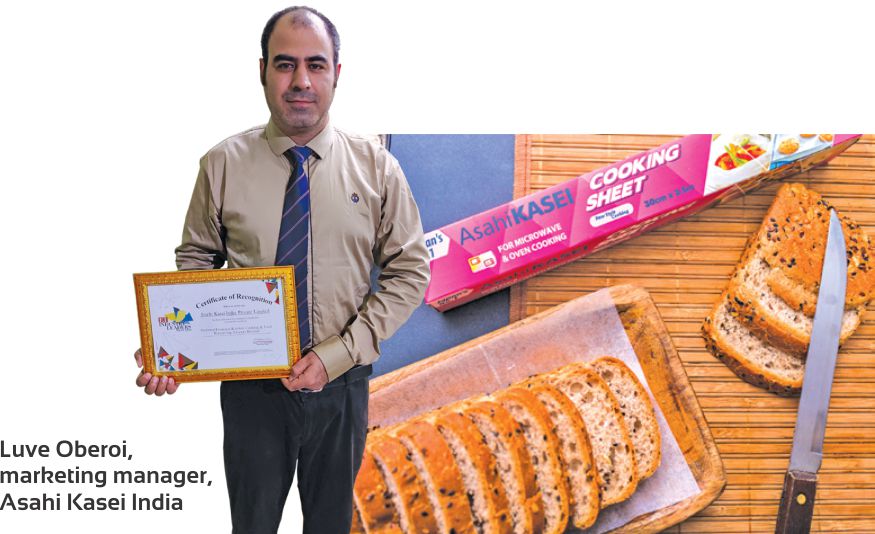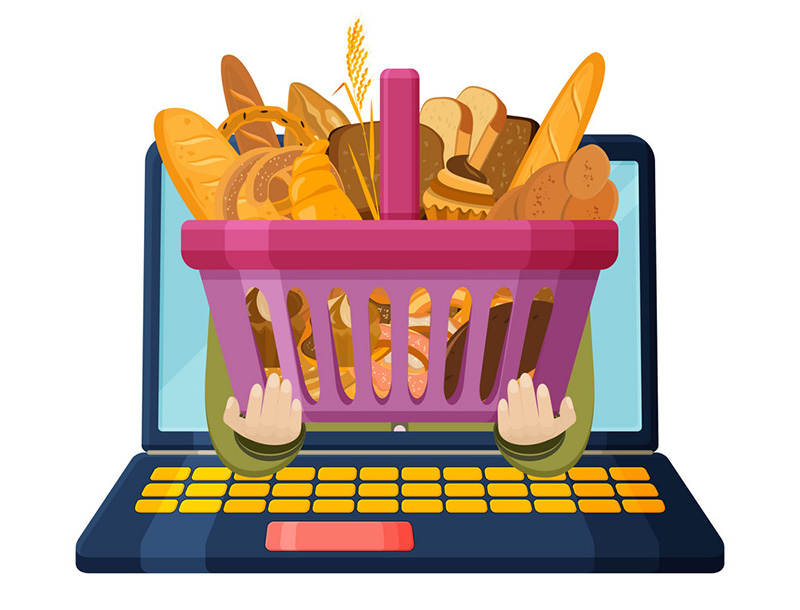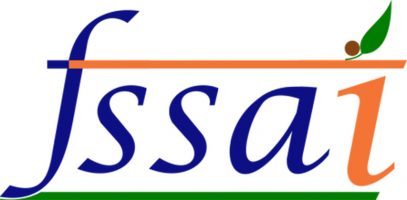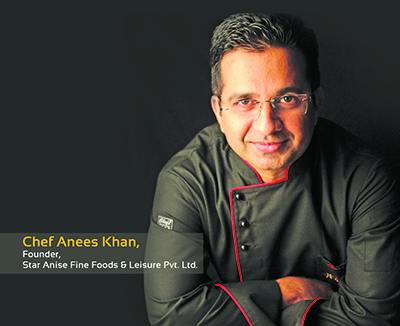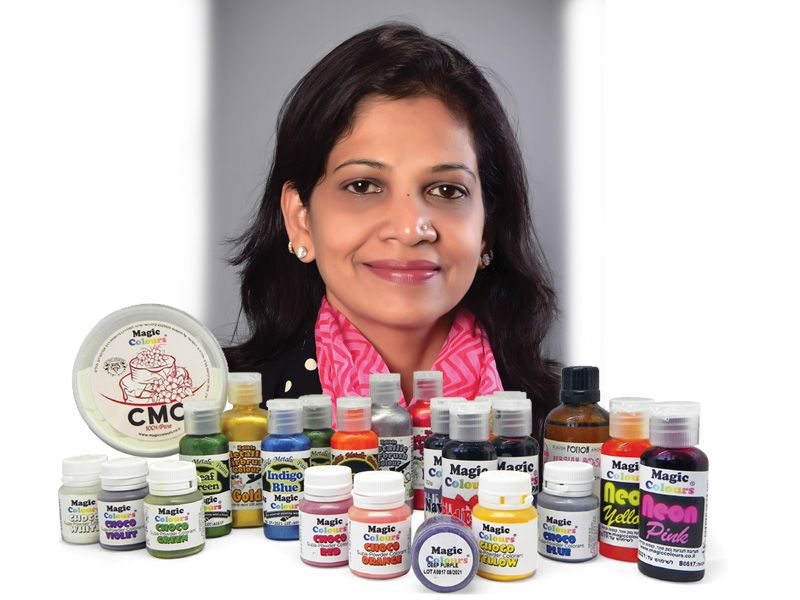FSSAI told to ask FBOs to give veg or non-veg info as an obligation
Bakery Biz, January-February, 2022
The Delhi High Court has directed FSSAI to ask food business operators (FBOs) to provide full details with respect to the ingredient and its source (veg or non-veg) on food products’ label. The High Court has also asked the Food Authority to issue a fresh notice regarding declaration of the info and about the ‘obligation’ on the food businesses for the same.
According to published reports, the Delhi High Court had ordered that the Food Authority should issue a fresh notice and make it widely publicised stating that the obligation placed on FBOs to disclose the vegetarian or non-vegetarian nature of the food. The court has observed that the ‘non-discloser’ of the food item being veg or non-veg, affects the ‘fundamental rights’.
Earlier, on court’s direction FSSAI had issued a direction asking food businesses to declare on the label ‘correctly’ whether the food product is ‘Veg’ or ‘Non-Veg’, irrespective of the percentage of any ingredient in the food.
This came after the Delhi High Court pulled up the food regulator on a petition saying that food businesses hide info about ingredients source (plant or animal). The court had observed that it should be fairly disclosed as to what is the plant source or animal source.
FSSAI Draft Regulations: Without a Prior Nod, No GMOs in Food Items
Bakery Biz, January-February, 2022
According to the draft regulations released by the Food Safety Authority of India (FSSAI), without prior approval, food companies cannot manufacture or sell any food products or food ingredients derived from genetically modified organisms (GMOs).
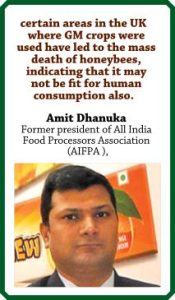 The publication of the Draft Regulations and the possibility of officially permitting use of GMO food products in India has raised numerous debates among public. Environmentalist strongly oppose use and consumption of GMO food products with adverse impact on health, food safety, soil and environmental at large whereas others rely on the perceived benefits and advantages of implementing this novel technology for better yield, productive and less food wastage. The finalisation and implementation of the Draft Regulations is subject to the responses and comments of the stakeholders and their assimilation in the Draft Regulations.
The publication of the Draft Regulations and the possibility of officially permitting use of GMO food products in India has raised numerous debates among public. Environmentalist strongly oppose use and consumption of GMO food products with adverse impact on health, food safety, soil and environmental at large whereas others rely on the perceived benefits and advantages of implementing this novel technology for better yield, productive and less food wastage. The finalisation and implementation of the Draft Regulations is subject to the responses and comments of the stakeholders and their assimilation in the Draft Regulations.
Under their ambit, the regulations bring food products that may have been made using food ingredients or processing aid derived from GMOs, even if GM content is not present in the end product.
The draft regulations state “No person shall manufacture, store, distribute, sell or import in the country any food or food ingredient, as the case may be, derived from Genetically Modified Organisms, except prior approval of the FSSAI. The provisions of this regulation are in addition to, and not in derogation, of any other rules or regulations made under the Act.” The industry experts believe that “GM food can have environmental, health and trade security implications.”
The industry bodies representing food companies have said that GMOs should be completely banned.
Former president of All India Food Processors Association (AIFPA), Amit Dhanuka said “GMO should be completely banned and there should be no provision to give any ‘prior approval’ to any company.” Giving an example of the ill effects of GM crops, he stated, “certain areas in the UK where GM crops were used have led to the mass death of honeybees, indicating that it may not be fit for human consumption also.”
HRAWI collaborates with FSSAI to conduct FoSTaC programme
Bakery Biz, January-February, 2022
The Hotel and Restaurant Association of Western India (HRAWI), in collaboration with Food Safety and Standards Authority of India (FSSAI), conducted an Online Food Safety Supervisory Training in Advance Catering (FoSTaC), programme on February 18, 2022. The training was conducted virtually by Dr V Pashupathy and was attended by hospitality professionals from various hotel and restaurant establishments.
The programme focused on standard health and food handling practices for hospitality personnel and also covered information on licencing requirements of FSSAI, for hospitality establishments in the country. Sherry Bhatia, President, HRAWI, said, “Maintaining impeccable kitchen etiquettes are paramount for any respectable establishment. Since the pandemic broke out, the programme has become even more relevant and important for a hospitality professional today. Over and above the required knowledge on food handling and hygiene, the training imparts information on Covid appropriate behaviour and covers all the necessary dos and don’ts to follow for a hospitality professional. The programme has found good participation so far and we urge all hospitality establishments to enrol their staff in this training.”
All about Vegan: Understanding the Basics
Bakery Biz, July-August, 2021
 Veganism is extreme vegetarianism, and this concept can be traced to ancient Indian and eastern Mediterranean societies. The Greek philosopher and mathematician Pythagoras in 500 BC promoted kindness to all animals. Siddhartha Gautama (aka Buddha) taught his followers about vegetarian diet and followers of Hinduism and Jainism too advocated veganism.
Veganism is extreme vegetarianism, and this concept can be traced to ancient Indian and eastern Mediterranean societies. The Greek philosopher and mathematician Pythagoras in 500 BC promoted kindness to all animals. Siddhartha Gautama (aka Buddha) taught his followers about vegetarian diet and followers of Hinduism and Jainism too advocated veganism.
The true movement towards vegan diet took form with William Lambe, when the London-based physicist stated that plant-based diet could cure anything from acne to tuberculosis. The term ‘vegan’ was coined in 1944 by Donald Watson an English animal rights activist who also cofounded the Vegan Society. Many food business operators (FBOs) today have started claiming their product to be Vegan. It is good branding exercise, calling in all the health enthusiasts as well as PETA sympathizers to up the sales across the food retail.
Vegan is simply any vegetarian product with additional restriction for not having any ingredient of the vegetarian product derived from animal source and / or no animal has been used in making of the product. So, Milk, Honey, certain additives like Cochineal, Lecithin, Glycerol, Gelatin, Isinglass, Vitamin D3 etc. are a complete NO. An ethical religious view on Veganism is all about choosing a way of life which excludes all forms of exploitation of animals for consumption of food.
Now, more importantly the Brand Vegan is building up a revenue base which is expected to be exceeding $21 billion by 2024, as per Global Market Insights. The US market has seen a 400 per cent increase in the number of vegan products and as per the latest report by IMARC group ‘Vegan Food Market: Global Industry Trends, Share, Size, Growth, opportunities and Forecast 2021-2026’, the global market is expected to grow at a CAGR of 11.4 per cent during 2021-2026. Many certification bodies have become the early birds to catch the worm… Oops, we are talking about Vegan, so no mention of animals here.
A quick business in certifying products as Vegan has led to many FBOs using the brand Vegan to differentiate themselves on the shelfs and in turn zooming away to big sales numbers. The countries that encompass global vegan market include India, Brazil, China, France, Germany, Indonesia, Australia, Russia, South Korea, UK and the US. The top international market players being Amy’s Kitchen, Daiya Foods Inc., Plamil Foods Inc., Danone S.A, Beyond Meat Inc. and Eden Foods.
Many Indian brands too are catching up with the vegan craze. Some of the top brands in India being Veggie Champ, Promeat, Imagine Meats, Mister Veg, Greenest Foods, Vegeta Gold, Good Dot, Vezlay, Strive, Evo Foods, Plant Made, White Cub and many more. The key products that are covered consists of mock meat products, egg products, cheese and milk products which dominate the
market.
The working group led by the NGO Safe (Safe Food Advocacy Europe) has developed a standard known as Vegan Standards 2019, EU and other countries are in the process of developing regulations for label declaration. There are many international organizations such as the Vegan Society that evaluate the products and allow the manufacturers to display trademark ‘Vegan Logo’ based on their private evaluations.
So, do we really need Vegan? Well for health maybe or maybe not, but for business it is becoming a must to have. To reign in the free for all Vegan Branding and ultimate objective of protecting the gullible consumer, our food authority has interestingly come up with much needed guidelines on Vegan.
Food Safety and Standards Authority of India (FSSAI) defines Vegan Food as those food or ingredients that have not been made by use of any additives, ingredients and processing aids of animal origin. These include fish, meat, poultry, milk and milk products, egg or egg products, materials of insect origin like silk, dyes, chitin, etc., honey and honey products or ingredients which are clarified using animal products.
As per notification no. F. No. Std/TF-Vegan Foods/Notif./FSSAI., dated 6th September 2021, FSSAI has formulated the draft regulations called Food Safety and Standards (Vegan Foods) Regulations, 2021. As per these regulations no manufacturer or Food Business Operator shall manufacture, sell, market, distribute or import vegan food unless they meet the specifications of these
regulations. Additionally, all vegan food must be such that it has not been subjected to animal testing for evaluation of suitability of the food products and the food shall not be derived from any animal based Genetically Modified Organisms (GMOs). Traceability shall be established up to manufacture level to maintain the integrity of the Vegan product, along with compliance to all relevant provisions of the Act, rules and regulations defined by the food authority.
How can an FBO ensure compliance to these regulations?
- Submission of application with details pertaining to the plant/facility/premises. The premises will be verified and inspected by the respective Designated Officer/Food Safety Officer.
- Analytical testing (molecular / chemical / combination of both) of the product by a laboratory for establishing the absence of animal origin and this information can thus be used for vegan logo in license.
- Annual surveillance shall be undertaken by licensing authority at least once in a year.
How should Vegan food be labelled and displayed?
- Vegan foods must comply with all the packaging & labelling requirements under the Food Safety & Standards (Labelling & Display) Regulations, 2020.
- The FBO must also comply to all regulations mentioned under Food Safety & Standards (Vegan Food) Regulations, 2021.
- The FBO/seller must ensure that all vegan food is stored and displayed separately from non-vegan food.
- All packages must carry the Vegan logo as shown in the image

This draft would be subjected to scrutiny by ALL, but we must thank FSSAI for coming up with this regulation at the right time. It will certainly bring in the alignment and help the FBOs as well as the consumer to have informed decision. The Vegan Logo of FSSAI is also set to become a brand – Brand India.
It is also equally important that the food handlers be made aware about conscious handling of vegan foods and the critical control points with appropriate training under the FSSAI Food Safety Training and Certification FoSTaC program. One more training requirement for the FBO!

Dr Nilesh Amritkar,
MD, Envirocare Labs
About the Author: Dr. Nilesh Amritkar is PhD in Microbiology from UDCT Mumbai and is currently Managing Director, at Envirocare Labs. He is working in the field of Testing, Inspection and Certification of Food, Environment, Pharma, and Consumer Products since past 21 years. Envirocare Labs over the past 40+ years has been in the forefront of monitoring, analysis, research, training, inspections and auditing and has grown into a World Class Laboratory spread across 50,000+ Sq. ft with state-of-the-art instrumentation. They are accredited under ISO 17025 by NABL and are recognized by MoEF, MoFPI, FSSAI, BIS, EIC, FDA, APEDA and AGMARK. To get your products tested for vegan food declaration, write at info@envirocare.co.in
Draft norms for Vegan Foods issued by FSSAI
Bakery Biz, July-August, 2021
 The Indian food regulator, FSSAI, has issued a draft called the Food Safety and Standards (Vegan Foods) Regulations, 2021, for regulating vegan foods and asked stakeholders to submit their suggestions. Under these regulations, the FSSAI has defined ‘vegan food’, general requirements under FSS Act, vegan food compliance mechanism, labelling and display requirements including a logo for such products.
The Indian food regulator, FSSAI, has issued a draft called the Food Safety and Standards (Vegan Foods) Regulations, 2021, for regulating vegan foods and asked stakeholders to submit their suggestions. Under these regulations, the FSSAI has defined ‘vegan food’, general requirements under FSS Act, vegan food compliance mechanism, labelling and display requirements including a logo for such products.
According to FSSAI, vegan food means those foods or food ingredients that have not made use of any ingredients, additives and processing aids of animal origin including milk and milk products, fish, poultry and meat, egg or egg products, honey or honey bee products, materials of insect origin like silk, dyes, chitin/chitosan etc. or ingredients that are clarified using animal sourced products e.g., bone char used in sugar bleaching, isinglass in clarifying beer etc.
The general requirement under regulations lays that without complying with these standards/ regulations, no person shall manufacture, pack, sell, offer for sale, market or otherwise distribute or import any food as vegan food.
Also, such product shall not include any animal testing for assessing the safety of the final product or ingredient, says the draft while the traceability should be established up to manufacturer level.
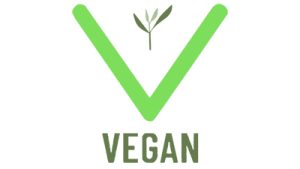 FSSAI says that the FBOs of such vegan products need to apply with all relevant details and there will be a verification by use of analytical tools to ascertain absence of animal origin for endorsement of such product and vegan logo. Further, FSSAI reserves the right for surveillance on such products claiming vegan. Meanwhile, the FSSAI has also issued a logo for such vegan products and all vegan foods shall comply with the packaging and labelling requirements specified under the Food Safety and Standards (Labelling and Display) Regulations, 2020, in addition to the labelling requirements specified under the proposed regulations.
FSSAI says that the FBOs of such vegan products need to apply with all relevant details and there will be a verification by use of analytical tools to ascertain absence of animal origin for endorsement of such product and vegan logo. Further, FSSAI reserves the right for surveillance on such products claiming vegan. Meanwhile, the FSSAI has also issued a logo for such vegan products and all vegan foods shall comply with the packaging and labelling requirements specified under the Food Safety and Standards (Labelling and Display) Regulations, 2020, in addition to the labelling requirements specified under the proposed regulations.
===========================================================================================================================================================================
 “With the new FSSAI ruling, it is a clear indication of the ever-growing demand for vegan F&B products in the Indian market. With people now moving towards eating planet-friendly foods, and the strong desire to keep pandemics off our plates, the vegan logo will act as a beacon of hope, for a future where vegan food is no longer villainized but embraced and accepted.”
“With the new FSSAI ruling, it is a clear indication of the ever-growing demand for vegan F&B products in the Indian market. With people now moving towards eating planet-friendly foods, and the strong desire to keep pandemics off our plates, the vegan logo will act as a beacon of hope, for a future where vegan food is no longer villainized but embraced and accepted.”
Naimita Jagasia, Chef Founder, An Ode To Gaia, India’s first Luxury Plant-Based Patisserie. Chef Naimita is an internationally recognised vegan pastry chef, entrepreneur, educator and mentor to over 500 aspiring chefs from across the globe.
===========================================================================================================================================================================
Bread Manufacturing Regulation: Why Is It Needed?
BakeryBiz, July-August, 2021
FSSAI’s latest norms, regulating the manufacturing of bread, the ingredients that go in it and its packaging, has had a diverse response from the industry. While most welcome the move calling it a step towards making it a level playing field for all, there is a concern about the ingredient composition aspects and a bigger fear of implementation at the largely unmonitored unorganised sector. Sumit Jha talks to industry partners to get an insight.

The convenience of bread has made it a go-to food for many. In India, over the years, the consumption of bread has been continuously rising. Busy lifestyle, changing eating habits, increased
awareness about wellness and healthy lifestyle, and increase in spending towards food are some of the reasons which are driving this growth in the sale of bread.
With a Compounded Annual Growth Rate (CAGR) of more than 10 per cent, the Indian bread market (including white bread, brown bread, fruit bread and other segments) is projected to grow to USD 1.4 billion by 2026, highlighted a TechSci Research report. With continued growth in consumption of bread, and resultant increased number of bakers taking on bread manufacturing, there has been an explicit need for regulating the way bread is being made, what goes in it and how it is presented.
Steps in FSSAI, the Indian food regulatory body, that has been instrumental in laying down norms and creating a safe environment for the customer and a level playing field for the food producers. FSSAI has proposed measures (refer Table 1), which will be transformed into law soon. Such proactive government mandate is bound to create a clear unambiguous path for the manufacturers to follow and result in increased consumer confidence, thereby augmenting the sale of bread.
“It was long overdue. The move is a welcome one. We have been lobbying with the authorities for having a system in place that is standardised. I am happy that there is going to be a level playing field for all,” said Ramesh Mago, Owner – Kitty Bread, Ludhiana.

Ramesh Mago
MD, Kitty Bread, Ludhiana
“This is a positive and progressive move made by the regulators. It will definitely help in increasing the awareness among customers. People will have more faith in brands and the organised sector will get further streamlined,” informed Salahuddin Khan, COO – Kwality Confectionary Bakers India Pvt. Ltd.
“At The Baker’s Dozen, we have always believed in going above and beyond the basic guidelines. It helps us to make a superior product, hence elevates our potential for customer loyalty. Having said that, it also sets us at a disadvantage compared to other counterparts because customers aren’t aware of this knowledge. The new guidelines being more detailed and quality specific also will lead to the development of the overall industry and more importantly, will benefit the customers,” said Chef Aditi Handa, Head Baker and Co-Founder of The Baker’s Dozen, a hand-crafted artisan bakery brand.
“As a part of Food Industry, it is a must for us to ensure that we deliver Safe, Healthy and Nutritious Food to our Consumers. The guidelines or the new rules of FSSAI have set Standards for the Food Operators on the hygiene practices, grooming standards, storage of food, display of products, packed foods, labeling, nutritional information, allergen information, shelf life, frozen foods, thawing process, temperature, and the food transportation vehicle. Training sessions must be conducted for all involved in food production and food handlers by authorized staff at their work area. This kind of training must be conducted repeatedly. From the customers’ point of view, they will get confidence in the products, including the brands that are following these standards set by FSSAI,” informed Chef Boopesh Pichaimani, Brand Chef, Writers Cafe.
Implementation for other products may be deferred

G Selvarajan,
Chairman of McRennett Foods Pvt. Ltd, Founder President – Tamil Nadu Bakers Federation – India,
and Past President – Society of Indian Bakers
The below mentioned two varieties of bread are the most popular products and the regulations may be justified: Whole wheat Bread: The minimum amount of whole wheat atta to be used is set at 75 per cent. There are certain technical constraints in making a loaf of marketable whole wheat bread and yet 75 per cent is doable with certain process modifications by the bakers. Wheat Bread or Brown bread: Similarly use of 50 per cent of whole wheat atta as a minimum is realistic and bakers should have no practical problems in making and marketing this bread.
As far as all the other bakery products are concerned, they are not widely marketed and hence there is no pressing urgency to set a minimum amount of specialty ingredients in these products.
FSSAI may appoint a technical committee from leading bakery associations and organizations to discuss the technical feasibility of making marketable products for the rest of the bakery products. In their anxiety to set standards, FSSAI should not kill the products or set unrealistic standards. Implementation for these bakery products may be deferred by one year. – G Selvarajan
The Concerns
While the move is being welcomed by all and promises to be creating a positive playground for all involved, there are some concerns being raised by the manufacturers. The Society of Indian Bakers and Tamil Nadu Bakers Federation have suggested some changes (refer Table 2) based on the feasibility of bread production. Many have shown their concern that if the prescribed norms of inclusions in the bread are followed, it may impact the final product.
“This was a much-needed regulation and is a welcome move by FSSAI. We are all for it. We as representatives of Society of Indian Bakers and Tamil Nadu Bakers Federation have suggested some changes, which are derived from the practicality of bread production,” said Joseph Lawrence, an eminent baker recognised as Master Trainer in Baking by FICSI – SKILL INDIA. There has been a process of talking to the members of the various bakery bodies from across the country to understand their concerns. A concise report is being drafted to be collectively put forward to FSSAI so as to get the necessary changes implemented in the final rules.
Implementation Worries
While the regulations would work as a guideline for the bakers, the story is slightly different for the unorganised sector. There is an explicit need of finding a way to influence and monitor these members from the unorganised sector, which dominates the industry – if unverified numbers are to be believed, they account for almost 80 per cent of the overall market.

Salahuddin Khan, COO – Kwality Confectionary Bakers India Pvt. Ltd

Chef Boopesh Pichaimani
Brand Chef, Writers Cafe
“It is going to be difficult for the unorganised sector, which accounts for about 80 per cent of the total market. In times to come, they will need to follow the norms and would have to come into the organised sector. Having said that, there is a cost that we pay for following the rules. GST paid by us cannot be claimed as a manufacturer and adds up to the cost of the bread and is ultimately payable by the customer. If the GST can be claimed, the cost could be lowered for the customer,” added Salahuddin.
There lies a big gap. Suggestive of an explicit need for the authorities to find a way of reaching the bakers across the segment to spread awareness and persuade them to follow the rules or be ready to be penalised for it.
The Packaging Woes
Packaging has been a point of concern for many – for the unqualified depiction that some of the packets make to attract customers, to the costs involved in following the protocol of changing packaging design. There has been a concern raised from time to time about the expenses involved and the inconvenience caused due to change in norms decided by FSSAI with regards to packaging. Many have recommended that such change should be limited to a maximum of one time a year. Some also feel that the basic elements once finalised, the other changes can be marked and made visible to the customer through a QR code printed on the packets.
“As for the packaging, there are many false claims being made about the bread and it is misleading. A standard format in place for it is a welcome move that will place everyone on a level playing field. I feel that there should be QR code that should be printed on the bread packet that should give the necessary details required. This will be beneficial to the manufacturers as they will not need to change the packaging design from time to time,” added Lawrence.

Chef Aditi Handa
Head Baker and Co-Founder of The Baker’s Dozen

Joseph Lawrence
Master Trainer in Baking recognised by FICSI – SKILL INDIA
“Change in packaging and the costs associated with it is a onetime concern, but once it is all in place, it is going to be good, and would make things convenient. It is believed that more transparency
in what is being offered to the customer leads to gaining customer confidence. Today, people are willing to pay more as long as they are assured that they are getting a healthy product,” informed Salahuddin.
“In the older times, people were worried about sharing their recipe and ingredients. It is not rocket science anymore. Showcasing the ingredients on the packaging has not been a point of concern. Selling the products and maintaining the market position is important,” added Salahuddin.
Road ahead
While the regulations are a necessity – resulting in ensuring standardisation and quality adherence, thereby leading to consumer confidence, the focus also needs to be placed on bringing in more and more FBOs into the ambit of FSSAI regulations. Industry representation across segments and a discussion about what modifications are required in the proposed rules to make it acceptable across the board would make it possible to create a win-win situation for all stakeholders and the customer at large.
FSSAI Slashes Limit for Transfat Levels in Foods
BakeryBiz, May-June, 2021
THE HINDU article dat ed Jan 3rd 2021 as below, will help shine some light on the same
FSSAI slashes limit for Transfat levels in foods The country’s food regulatory body notified the amendment on December 29, more than a year after it
issued a draft on the subject for consultation with stakeholders. The revised regulation applies to edible refined oils, vanaspati (partially hydrogenated oils), margarine, bakery shortenings, and other mediums of cooking such as vegetable fat spreads and mixed fat spreads. Transfats are associated with increased risk of heart attacks and death from coronary heart disease. As per the World Health Organisation (WHO), approximately 5.4 lakh deaths take place each year globally because of intake of industrially produced trans fatty acids. The WHO has also called for global elimination of trans fats by 2023. “The FSSAI rule comes at the time of a pandemic where the burden of non-communicable diseases has risen. Cardiovascular diseases along with diabetes are proving fatal for COVID- 19 patients,” says Ashim Sanyal, Chief Operating Officer of Consumer VOICE, adding that the regulation must not be restricted to oils and fats, but must apply to all foods. “Hopefully, FSSAI will address this as well before January 2022 to eliminate chemical trans fatty acids from the Indian platter.
”While the regulation comes into effect immediately, industry players were made to take a pledge back in 2018 that they would comply with WHO’s call for action to reduce TFA by 3 per cent by 2021 allowing them three years to comply with the latest regulation. It was in 2011 that India first passed a regulation that set a TFA limit of 10 per cent in oils and fats, which was further reduced to 5 per cent in 2015.
FSSAI may regulate exports under FSS Act
BakeryBiz, Mar-Apr, 2021
The Food Safety and Standards Authority of India is doing exemplary work in regard to ensuring food safety in the country. Among the various initiatives by the Authority in recent times is FoSCoS that aims at easing the licensing and registration procedure for Food Business Operators (FBO). The Authority is also making relentless efforts to update the standards to international levels, improve food testing by setting up new labs and upgrading manpower and other resources with focus on ease of doing business for FBOs. In its latest initiative, FSSAI is set to regulate exports of food in the country, making the export-import scenario at par with developed countries, informed Arun Singhal, CEO, FSSAI.
The Food Safety Compliance System (FoSCoS) was launched pan-India with effect from November 1, 2020, replacing an ageing and outdated Food Licensing and Registration System (FLRS). FoSCoS functions on a cloud-based server with upgraded software and hardware, which has improved the speed and efficiency of licensing. It is envisaged to be a one-stop ‘Compliance Portal’ for food safety and in future will incorporate modules for functional needs such as advanced MIS, integration with InFolNet and FICS; Hygiene Rating and Audits etc.
FSSAI urges CII to spread awareness about the one stop digital portal
BakeryBiz, Mar-Apr, 2021
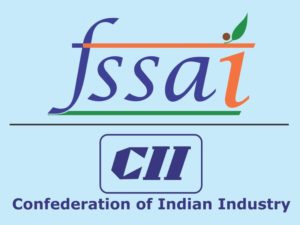 The Food Safety & Standards Authority of India (FSSAI) has urged CII to spread awareness about the one stop digital portal for new licensing that it had launched last July. Col Pramod Shahaji Dahitule, Regional Director, Eastern Region, FSSAI said this at the 6th Food Processing Conclave organised by CII recently.
The Food Safety & Standards Authority of India (FSSAI) has urged CII to spread awareness about the one stop digital portal for new licensing that it had launched last July. Col Pramod Shahaji Dahitule, Regional Director, Eastern Region, FSSAI said this at the 6th Food Processing Conclave organised by CII recently.
Speaking at length Dahitule said that with sudden outbreak of the pandemic, the department played a proactive role with a primary focus on ensuring uninterrupted inter-state supply chain movement and maintain food safety as a business cannot thrive without food safety. The foremost challenge for the food authority was to burst rumours, provide safe and wholesome food and regain exports.
FSSAI has been prompt in adopting different strategies to deal with the pandemic.
FSSAI launched separate websites, customized training programs were introduced, and upgraded labs in all the states of the region were undertaken. The regulatory authority is now urging the states to take advantage of dedicated funding allotted for them by signing MoUs.
Food Quality & Safety
BakeryBiz, Jan-Feb, 2021
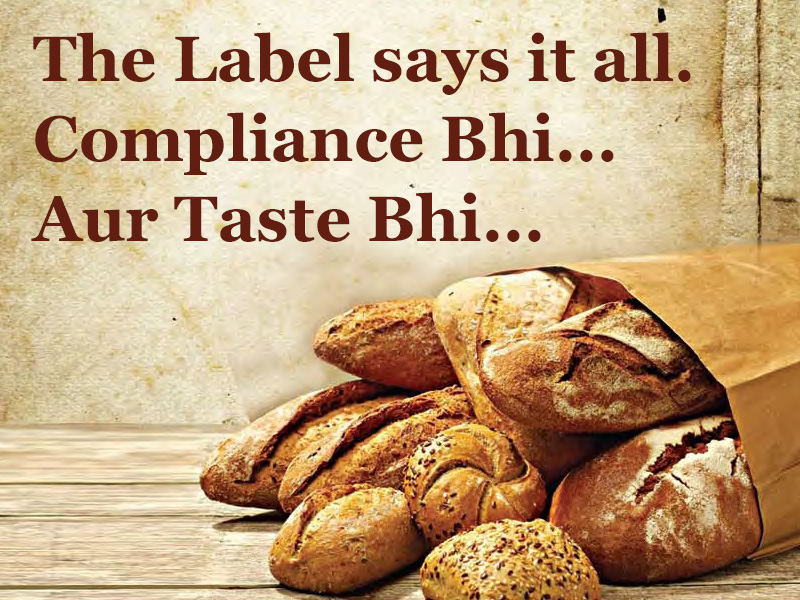
Cakes, cookies and baked delicacies…. the smell of freshly baked food brings a sense of immense joy and childhood memories just flash across. Innovations in food ingredients and processes is driving new products getting launched satiating the taste buds of food enthusiasts and connoisseurs.
Bakery food is not just any food, it is an emotion for many. The conscious consumer is demanding not only healthy food but also keen to know the nutrition benefit provided by his food. The regulator has also tightened its grip over the products consumed emphasizing heavily on quality, safety and declarations made. The regulator has taken important steps to help create awareness and propagate healthy food through its Labelling Regulations and Eat Right Campaign.
Food Label is the front line salesperson of any food product. It talks to the customer and excites the consumer to experience it. Consumers also are keen to check if the product that they purchase meets the compliance standards, many have taken the adage – Jago Grahak Jago very seriously. The bakery industry in India is expected to grow at a CAGR of 9.3% during 2019 to 2024, and the current Covid-19 situation has actually helped new ventures in homemade bakery products to accelerate the growth.
Food Safety & Standards Authority of India, the food regulator in India has scientifically evolved the process of enforcing harmonized regulations across every FBO in the country. The initial Food Packaging and Labelling Regulations 2011 underwent major upgradation, and the draft was released in July 2019. After the initial comments and subsequent amendments, the final notification is now gazetted on November 2020 for full implementation by January 2022 as the Food Safety & Standards Labelling and Display Regulations 2020.
Food Safety & Standards (Labelling & Display) Regulations 2020, prescribes the requirements for pre-packaged foods and also lay emphasis on the display of essential information at premises where food is stored, manufactured and subjected to processing. These new regulations are also applicable to the baking industry, let us understand these norms and the measures that are to be taken by FB Os in ensuring awareness amongst all thereby creating a holistic and sound food safety ecosystem for this industry.
What’s in a label?
Food label must be such that they convey information to consumers about your product irrespective of whether the product is being sold directly or via means of e-commerce. It is vital that the label is not presented in a form that is deceptive or misleading in any way. The label can be in English or Hindi in Devnagiri script and in addition any other local language can also be used. It is equally important that the label be unambiguous, clear, indelible and legible to the consumer at all times.
The below mentioned details are mandatory to be displayed on the label:
- Name of the food indicating its true nature
- List of ingredients in descending order of their composition including food additives
- Nutritional Information per 100g or 100 ml or per single consumption pack of the product and per serve contribution to the Recommended Daily Allowance (RDA) containing information about:
-
- Energy value (kcal)
- Protein(g), Carbohydrate(g), Total Sugars(g), Added Sugars(g)
- Total fat(g), Saturated fat (g), trans fat(g) & cholesterol (mg)
- Sodium (mg)
These regulations have also stipulated the conversion factors that are to be used for calculating the energy values and protein content.
- Declaration of Veg or Non-Veg: It is mandatory for every packaged food to bear the symbol demarcating veg and non-veg foods. FSSAI has now changed the symbol that was being used for Non veg foods from red filled circle to the brown color filled triangle inside a square.
- Declaration pertaining to the Food Additives in the form of functional classes with specific name of the INS number as specified in FSSR (Food Safety Standards and Food Additives), 2011 must be mentioned in this list of ingredients
- Name and complete address of the brand owner preceded by the terminologies such as ‘Manufactured by’, ‘Marketed by’, ‘Manufactured & Marketed by’ or ‘Marketed & Packed by’ or ‘Bottled by’, ‘Blended & Bottled by’, ‘Imported & Bottled by’ or ‘Distilled & Bottled by’ as the case may be
- In case the article of food is imported in India, the name and complete address of the importer in India must be declared on the label and in cases where the product is manufactured outside India but packaged or bottled in India it is essential to mention the name of the country of origin of food
- FSSAI Logo and license number of the brand owner, including that of the manufacturer, marketer, packer or bottler is to be declared on the label. It is essential that the FB O displays the license no./ registration or Food Safety Display Board if specified at prominent places in the premises
- Food that falls into the fortified food or organic category must be marked with the logos as specified under schedule II of the Food Safety & Standards (Labelling & Display) Regulations, 2020.
- Net quantity, retail sale price & Consumer Care should be declared as per the Legal Metrology Act 2009.
- The label must also bear lot, code or batch identification
- Expiry date or date of manufacture or packaging
- Special conditions for storage of food if any
- Labelling of imported foods as per the Food Safety & Standards (Import) Regulations 2017
- Instructions for use including reconstitution
- Food Allergens
- Declaration of food material sold in retail but not for consumption to be declared with the symbol
Food Service Establishments need to ensure that it follows the display regulations as stipulated by FSSAI.
Establishments having a central license or outlets at 10 or more locations should display the following:
- Calorific value (in kcal per serving and serving size) on menu cards or boards or in the form of booklets
- Information pertaining to food allergens which can also be depicted by simple symbols that are easy to comprehend
- Logo for veg or non-veg
- Reference information on calorie requirements must be displayed as “An average active adult requires 2,000 kcal energy per day, however calorie needs may vary”
- Nutritional information
- The same information should also be mentioned on website in case of E-commerce
- The nutritional information/ ingredients along with health messages should be displayed where food is served
The Labeling & Display Regulations have also given detailed requirements for non-retail containers, for food
additives and Schedule II of the regulations have specified the mandatory declarations for certain specific food ingredients/additives such as Maida, flavor emulsions, common salt, gelatin and artificial sweeteners. Every package of biscuits, cakes and bread and bakery products where trehalose or dextrin is incorporated, the FBO must declare the same on the label as ‘contains trehalose’ and ‘contains Dietary Fibre (Dextrin) respectively. Specific declarations need to be made in case of bakery products that contain phytosterols. FSSAI requires the products that are free of gluten to be declared accordingly on the label.
Compliance to these regulations not only helps you create an awareness amongst your consumers, but the transparency also helps build the trust. Correct use of these regulations will help manufacturers develop their brand reach and increase brand recall as well. Help your consumers by giving them the visibility that drives them to eat healthy & be safe.

Dr Nilesh Amritkar,
MD, Envirocare Labs
Envirocare Labs over the past 40+ years has been in the forefront of monitoring, analysis, research, training, inspections and auditing and has grown into a World Class Laboratory spread across 50000+ Sq. ft and state-of-the-art instrumentation in the field of Environment, Food and Consumer Products. We are accredited under ISO 17025 by NABL and are recognized by MoEF, MoFPI, FSSAI, BIS, EIC, APEDA and AGMARK.
Acknowledgement: Ms Anuprita Raichurkar Joshi for help in collating the information.


 The publication of the Draft Regulations and the possibility of officially permitting use of GMO food products in India has raised numerous debates among public. Environmentalist strongly oppose use and consumption of GMO food products with adverse impact on health, food safety, soil and environmental at large whereas others rely on the perceived benefits and advantages of implementing this novel technology for better yield, productive and less food wastage. The finalisation and implementation of the Draft Regulations is subject to the responses and comments of the stakeholders and their assimilation in the Draft Regulations.
The publication of the Draft Regulations and the possibility of officially permitting use of GMO food products in India has raised numerous debates among public. Environmentalist strongly oppose use and consumption of GMO food products with adverse impact on health, food safety, soil and environmental at large whereas others rely on the perceived benefits and advantages of implementing this novel technology for better yield, productive and less food wastage. The finalisation and implementation of the Draft Regulations is subject to the responses and comments of the stakeholders and their assimilation in the Draft Regulations. Veganism is extreme vegetarianism, and this concept can be traced to ancient Indian and eastern Mediterranean societies. The Greek philosopher and mathematician Pythagoras in 500 BC promoted kindness to all animals. Siddhartha Gautama (aka Buddha) taught his followers about vegetarian diet and followers of Hinduism and Jainism too advocated veganism.
Veganism is extreme vegetarianism, and this concept can be traced to ancient Indian and eastern Mediterranean societies. The Greek philosopher and mathematician Pythagoras in 500 BC promoted kindness to all animals. Siddhartha Gautama (aka Buddha) taught his followers about vegetarian diet and followers of Hinduism and Jainism too advocated veganism.

 FSSAI says that the FBOs of such vegan products need to apply with all relevant details and there will be a verification by use of analytical tools to ascertain absence of animal origin for endorsement of such product and vegan logo. Further, FSSAI reserves the right for surveillance on such products claiming vegan. Meanwhile, the FSSAI has also issued a logo for such vegan products and all vegan foods shall comply with the packaging and labelling requirements specified under the Food Safety and Standards (Labelling and Display) Regulations, 2020, in addition to the labelling requirements specified under the proposed regulations.
FSSAI says that the FBOs of such vegan products need to apply with all relevant details and there will be a verification by use of analytical tools to ascertain absence of animal origin for endorsement of such product and vegan logo. Further, FSSAI reserves the right for surveillance on such products claiming vegan. Meanwhile, the FSSAI has also issued a logo for such vegan products and all vegan foods shall comply with the packaging and labelling requirements specified under the Food Safety and Standards (Labelling and Display) Regulations, 2020, in addition to the labelling requirements specified under the proposed regulations. “With the new FSSAI ruling, it is a clear indication of the ever-growing demand for vegan F&B products in the Indian market. With people now moving towards eating planet-friendly foods, and the strong desire to keep pandemics off our plates, the vegan logo will act as a beacon of hope, for a future where vegan food is no longer villainized but embraced and accepted.”
“With the new FSSAI ruling, it is a clear indication of the ever-growing demand for vegan F&B products in the Indian market. With people now moving towards eating planet-friendly foods, and the strong desire to keep pandemics off our plates, the vegan logo will act as a beacon of hope, for a future where vegan food is no longer villainized but embraced and accepted.”






 The Food Safety & Standards Authority of India (FSSAI) has urged CII to spread awareness about the one stop digital portal for new licensing that it had launched last July. Col Pramod Shahaji Dahitule, Regional Director, Eastern Region, FSSAI said this at the 6th Food Processing Conclave organised by CII recently.
The Food Safety & Standards Authority of India (FSSAI) has urged CII to spread awareness about the one stop digital portal for new licensing that it had launched last July. Col Pramod Shahaji Dahitule, Regional Director, Eastern Region, FSSAI said this at the 6th Food Processing Conclave organised by CII recently.


